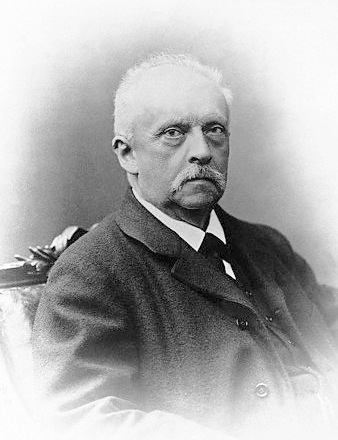Hermann Von Helmholtz Facts For Kids
Hermann von Helmholtz was a German physicist and physician known for his significant contributions to physics, physiology, and psychology, especially in the areas of energy conservation and sensory perception.


Set reading age
View for Kids
Easy to read and understand
View for Students
Clear, detailed explanations
View for Scholars
Deep dives and big ideas
Introduction
Hermann von Helmholtz was a smart German scientist born on August 31, 1821, in Potsdam, Germany 🇩🇪. He was not only a physicist but also a doctor! Helmholtz loved to explore how things worked in nature. He studied subjects like energy, sound, and the human body 🧠. His ideas helped people understand how energy moves and how our senses work. Hermann was curious about everything around him, and he used his knowledge to make the world a better place. He passed away on September 8, 1894, but his discoveries still help us today! ✨
Gallery of Hermann Von Helmholtz Facts For Kids
Awards And Honors
Hermann von Helmholtz received many awards for his brilliant work in science. 🏆In 1884, he became a member of the Royal Prussian Academy of Sciences in Berlin. He was also honored with the title "Nobleman" because of his amazing contributions to science! 🎖️ Helmholtz's achievements were recognized internationally, and he inspired many scientists to explore and discover new things. His impact is still celebrated today in science fairs and classrooms, encouraging young minds to be curious and creative!
Helmholtz Resonators
Helmholtz invented a special device called the Helmholtz resonator! 🛠️ This tool helped scientists study sounds and vibrations more effectively. It works like a musical instrument, kind of like a bottle 🎶. When you blow across the top, the air inside vibrates, producing sound! Helmholtz's resonators helped musicians understand how different sounds are made and how they interact with each other. This invention was important in the field of acoustics—a branch of science that explores how sound travels and is heard.
Early Life And Education
Hermann grew up in a family that valued learning. His father was a teacher, so education was important to them 📖. Young Hermann loved reading books and exploring science early on. He studied at the University of Berlin, where he learned from other brilliant teachers. Helmholtz was also good at art, and he played the piano! 🎹After finishing his medical studies, he became a doctor, but his love for physics pulled him towards scientific research. This combination of skills would help him create amazing discoveries in science!
Physiology And Sensation
Hermann von Helmholtz also studied how our bodies work! 🧬He explored how we see, hear, and feel. For example, he explained how light enters our eyes and how we perceive colors! 🌈He invented devices to measure sound and study how we hear. Helmholtz showed that our senses are connected to our brain, and they help us understand the world. This was helpful for doctors and teachers to understand human behavior, helping us learn how our feelings and senses play a role in everything we do!
Contributions To Psychology
In addition to his work in physics, Hermann von Helmholtz influenced psychology. 🧠He studied how we think, feel, and perceive the world around us. Helmholtz was one of the first to scientifically explore vision and how our brains interpret information from our senses. His experiments helped scientists understand the lag between seeing something and responding to it, leading to better insights into human behavior. By combining science and psychology, Helmholtz laid the groundwork for future studies in understanding our thoughts and feelings!
Influence On Modern Science
Helmholtz's discoveries have shaped modern science 🌟! His work laid the foundations for various fields, such as thermodynamics, optics, and physiology. Scientists still use his ideas to understand energy and our senses better. For example, his research on sound is used in music, engineering, and technology today! 🎵Without his contributions, many scientific advancements might not have been possible. That’s why Helmholtz is considered a pioneer—a person who explores new ideas in science and opens doors for others to follow!
Career And Key Contributions
Hermann von Helmholtz wasn't just a doctor; he was an explorer of science! 🌍He became a professor in different universities, including the University of Berlin. Helmholtz discovered the law of conservation of energy, which tells us that energy can change forms but is never lost. 🔄He also explored how light and sound work, leading to advancements in understanding waves. His work on the eyes and ears improved how we understand our senses, making him a key figure in many sciences, including physics, physiology, and psychology.
Legacy And Impact On Future Research
Hermann von Helmholtz's legacy lives on through his groundbreaking work! 🌍Scientists today still study his theories to learn more about energy, sound, and our senses. His contributions have influenced many important fields, from engineering to psychology. Helmholtz's life story teaches us that curiosity and hard work can lead to amazing discoveries 🚀! As children continue to ask questions and explore the world, they carry on his legacy, ensuring that science keeps growing and uncovering new mysteries! 👩🔬👨🔬
Thermodynamics And Energy Conservation
One of Helmholtz's major ideas was about energy! ⚡He talked about thermodynamics, which is the study of heat and energy. He found out that energy is always conserved. This means that energy can change from one form to another, like from food to movement, but it never disappears! Imagine riding a bike 🚴—the energy from your legs pushes the pedals, making you go forward. Helmholtz's work has helped scientists understand how engines work and how our planet’s energy systems function.
Hermann Von Helmholtz Facts For Kids Quiz


Make things. Learn new skills. Share safely.
DIY is a creative community where kids draw, build, explore ideas, and share.
No credit card required